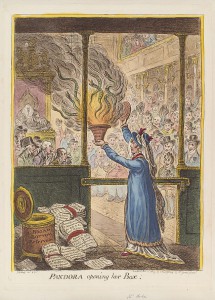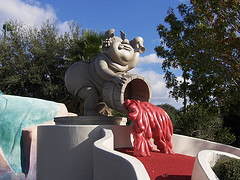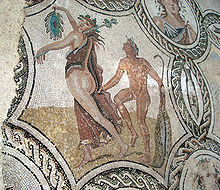Disney Mythology vs. Greco-Roman Mythology: Part II Posted by Brittany Britanniae on Nov 25, 2014 in Roman culture
Salvete Omnes!
Let’s continue with the Disney theme for this week! But don’t worry those Latin learners, next week we will begin Latin from the basics to the advance. If you have any questions or requests- please let comment below.
#6. Pandora’s Box
Film or Series: Once Upon a Time; 2011

Pandora opens the pithos given to her by Zeus, thus releasing all the bad things of the world. Courtesy of WikiCommons.
Disney Mythology: Pandora’s Box is a magical item featured on ABC’s Once Upon a Time. It first appears in the seventh episode of the third season. A picture of the device can be seen here.
Greco-Roman Mythology: Pandora’s Box is based on the titular item from the Greek myth. The box has the capability to store great evil, great magical, or simply human beings within it. Somewhat of a reverse of the ability of the original, as the original “Pandora’s box” was more like a amphora which held all the evils in the world (malice, greed, murder, etc.) and when she opened it they fled into the world with only hope left inside.
#7. BACCHUS
Film or Series: Fantasia, 1940 film.
Disney Mythology: Bacchus is the god of the grape harvest, winemaking and wine, of ritual madness, fertility, theatre and religious ecstasy.. He is a fun-loving Roman god, he is portrayed as an overweight, happily drunk man wearing a tunic and cloak, grape leaves on his head, and carrying a goblet of wine. He is friends with the fauns and centaurs, and is shown celebrating a harvest festival.
Greco-Roman Mythology: The way is portrayed is quite similar to his manner in mythology.
#7. MORPHEUS or LUNA
Film & Series: Fantasia; 1934. Hercules; 1997
Disney Mythology: Morpheus is a god of dreams who appears in Ovid’s Metamorphoses. Morpheus has the ability to mimic any human form and appear in dreams. His true semblance is that of a winged daemon, imagery shared with many of his siblings. Starting in the medieval period, the name Morpheus began to stand generally for the god of dreams or of sleep.[1]
Greco-Roman Mythology: However, the character (like many of Disney’s) is actually depicting Selene or Luna who rides a chariot bringing Night to the world. She rode, like her brother Helios, across the heavens in a chariot drawn by two white horses, cows, or mules (Ov. Fast. iv. 374). The following is a poor quality clip from Youtube, but you can see the same idea as the previous video of “Luna” making it night in the first three seconds:
#9. The Rape (Abduction) of Prosipina (Persephone)
Film or Series: The Goddess of Spring; 1934 & Beauty and the Beast; 1991.
Disney Mythology: The film known as the “Goddess of Spring” is a direct retelling of the Rape of Proserpina. There is the small exception that the “Hades” figure looks quite more “devilish” than one would expect for ancient mythology. Beauty and the Beast is more of a stretch, but the traditional story is still there. There is the Pluto (Beast), Prosipina (Belle), the abduction (Belle being kept in Beast’s castle), and the lack of season (It is fall and winter during her captivity),etc.
Greco-Roman Mythology: This story is originally Greek from the Homer Hymns to Demeter, but for most people and audience it is known from Ovid’s Metamorphoses. Pluto (Hades) falls in love with Prosipina (Persephone) and decides to steal her from the world and take her to the underworld. Whilst she is in the underworld, her mother Ceres (Demeter) mourns for her daughters disappearances. Her distraught causes the earth to begin its first fall and winter. With a constant bleak seasons plaguing humanity, Jupiter commands Pluto to give Prosipina back to the earth. Thus half the year, she spends in the underworld with Pluto and half is above ground with her mother. When she is with her mother, the season thrive (spring and summer). Thus we have seasons.
#9. Mythical Creatues
Film or Series: Chronicles of Naria;2005.
Disney Mythology: C.S. Lewis Mythology was basically taken from Greco-Roman sources.
Greco-Roman Mythology: The creature depicted in this series include satyrs, centaurs, minotaur-like creatues, unicorns, griffins, cyclopedes, etc. These monsters are recorded by Pliny in his Natural History and Ovid Metamorphoses.
#10. Atlantis
Film or Series: Atlantis; 2001.
Disney Mythology: Disney has Atlantis as this super advanced civilizations that was saved by their ancestor’s power. Furthermore, Atlantis is thought to be in Iceland and not the Mediterranean.
Greco-Roman Mythology: Plato is one the primary sources historians have for Atlantis. You can read it here.

Build vocabulary, practice pronunciation, and more with Transparent Language Online. Available anytime, anywhere, on any device.
About the Author: Brittany Britanniae
Hello There! Please feel free to ask me anything about Latin Grammar, Syntax, or the Ancient World.







Comments:
alex:
awsom
alex:
coool